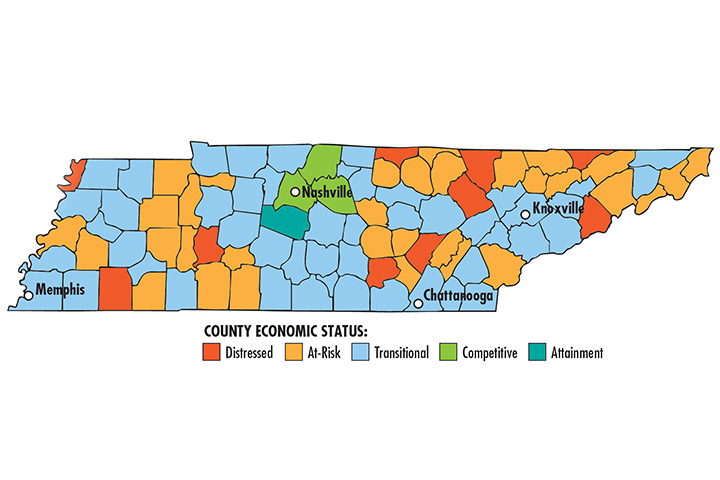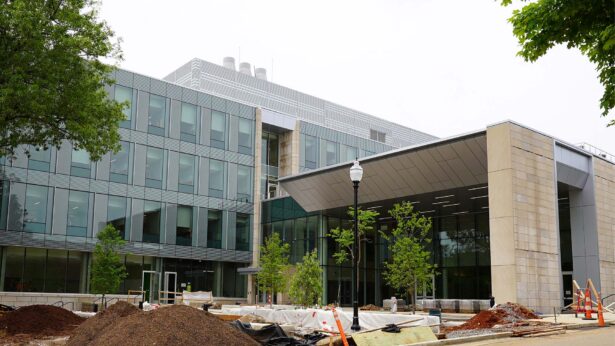Online only. Update your account online. Visit us online to enroll. Apply online.
Phrases like these are ubiquitous in today’s world, but for many rural Tennesseans, living without broadband means a barrier to landing a new job, finishing homework or finding resources to help make ends meet.
“At the University of Tennessee Institute of Agriculture, we are working to increase internet access in order to benefit economically distressed counties, impact local businesses’ bottom lines and improve the lives of Tennesseans and their families,” says Carrie Castille, UTIA senior vice chancellor and senior vice president. “Continuing to develop rural areas and enhance the skills of Tennessee’s workforce are grand challenges facing the state, and UTIA is making strides to identify real-life solutions in these areas.”
Sreedhar Upendram, an assistant professor in the Department of Agricultural and Resource Economics, leads UTIA’s work.
“Daily life is much more challenging if you don’t have internet,” he says. “Several Tennessee counties with limited access to this critical resource are also economically distressed, which impacts our state’s well-being.”
The term “economically distressed” comes from the Appalachian Regional Commission, which develops an annual economic status index for every county in the region. The index score is based on the three-year average unemployment rate, per capita market income and poverty rate. Counties are classified based on their combined indicators, and 10 counties across Tennessee qualify as economically distressed.
Generally, these communities have poor or limited internet access while counties with broadband access fare better. Grant-funded efforts at UTIA are impacting broadband availability in these communities and helping researchers address barriers Tennesseans face to accessing the internet.
Approximately 37 percent of rural Tennesseans do not have home access to high-speed broadband, and many cannot afford broadband services or the devices needed to use it. Although discounted rates are available for many—like low-income veterans, those enrolled in Supplemental Nutrition Assistance Program benefits or public housing, and families with at least one child enrolled in the federal free or reduced-cost lunch program—the benefits still depend on an internet service provider being in their communities.
UT Extension partnered with local libraries and elementary schools in six economically distressed counties to loan mobile hotspot devices free of charge for two to three days. In exchange, borrowers completed a survey about their usage, experience and willingness to pay for internet. The data from the survey is informing future efforts.
“We purposely chose these areas, and what we found was encouraging. Some usage was entertainment focused, which is fine, but the primary uses were educational, either with young children completing homework or with adults learning new skills for their careers,” Upendram says.
Jacob Boone serves as a UT Extension agent in Cannon County but previously worked in economically distressed Hancock County. He says COVID-19 exacerbated the effects of not having internet access at home.
“Kids with internet at home were able to stay afloat, while schools provided laptops and made accommodations for students without internet access. But those kids will likely play catch-up for the rest of their lives,” he says. “Having broadband would have leveled the playing field for them, but even then they may not have been able to afford it. Even if something is available, if you can’t pay for it, what use is that to you?”
East Tennessee’s topography also provides a challenge.

“Many families might try to use cellular data in the absence of broadband access, but sometimes tower signals don’t reach low-lying areas between Tennessee’s hills and mountains,” Boone says. “This is improving as more and more cell towers are constructed, but for much of Hancock County, in particular, that option is a nonstarter.”
Another UTIA project provided free broadband for one year in downtown Pikeville, the county seat of Bledsoe County. The internet availability supported local businesses, a local farmers market and several community meetings.
The recently launched 4-H Tech Changemakers program approaches broadband access from another angle—increasing digital literacy. Through this initiative, 4-H teen leaders develop skills they can teach to others, enhancing their communities and bridging science, technology, engineering and math gaps for their peers and adults within their neighborhoods. This project also equips young leaders with teaching and mentoring skills while also building technology and digital skills in older adults.
The primary goal of these programs is to enhance education, workforce development and economic growth through internet access, especially in economically distressed counties (see map above) where the poverty rate averages 23.5 percent. But there are other benefits, too. Families can spend time connecting with friends and relatives online, and those with chronic illness can use telehealth services and diabetes curricula to address disease management.
“These issues are multi-faceted across Tennessee, and there’s no one-size-fits-all solution,” says Upendram. “In some communities, availability is the challenge, and in others it’s affordability. But the bottom line is that being able to use fast internet at home can make a big difference, and UTIA is working to make that possible for more families.”
Want to learn more about broadband access in Tennessee or see the digital divide index score for your community? Visit utextensionced.tennessee.edu to dive into Tennessee’s data.



